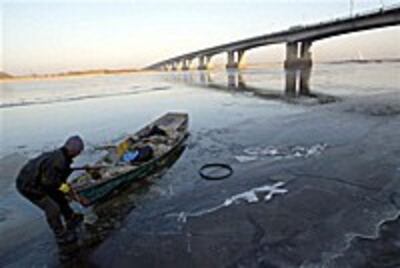
Attempts by local authorities to cover up news of a toxic spill in northeast China show a continuing “lack of good governance” in that country, an expert on China’s environment says.
This has resulted in a threat not only to Chinese people’s health and lives but to Russia as well, to an extent still unknown.
A Nov. 13 explosion at the Jilin Petroleum and Chemical Co. plant dumped tons of cancer-causing benzene and other chemicals into the Songhua River, contaminating the water supply of the nearby city of Harbin.
Plant managers denied blast
Plant managers at first denied that the blast had occurred. It then took more than a week for officials in China’s Heilongjiang province to warn Harbin residents that their water supply would be shut off.
There are few incentives for local officials in China to be the bearers of bad news within the system, because they believe they will likely be penalized for it politically from the higher-ups. Who knows how many people drank the contaminated water in Harbin?
Elizabeth Economy, director for Asia Studies at the New York-based Council on Foreign Relations, said the lessons of China’s SARS outbreak in 2003, also initially covered up, haven't been fully learned.
“There are few incentives for local officials in China to be the bearers of bad news within the system, because they believe they will likely be penalized for it politically from the higher-ups.”
“Who knows how many people drank the contaminated water in Harbin?" Economy said. “I think that we’re still dealing with a fundamental lack of good governance in China.”
Threat to Russia unclear
Speaking from Moscow, Roman Vazhenkov—acting campaign manager in Russia for the environmental group Greenpeace—said the full impact on Russia of China’s toxic spill may not be known for months.
Quite a lot of pollution comes from the Chinese side.
Vazhenkov noted that Russia’s Amur River, into which the Songhua flows, is now frozen over. “Ice slows down the [toxic] slick from going any further. So, we may be talking about consequences that may appear in the spring.”
Some chemicals are easily dissolved in water and pass into the food chain, Vazhenkov said. Others remain on the surface, evaporate, “and also pose some threat to human health.”
Citing information released by the Chinese consulate in the Russian city of Khabarovsk, Vazhenkov said half of the pollutants from the Jilin spill will “finally” reach Russia.
Vazhenkov added that water flowing into Russia from the Songhua is already an environmental concern because of China’s rapid economic growth.
“Quite a lot of pollution comes from the Chinese side,” Vazhenkov said.
Many in China drink polluted water
In fact, some 300 million people in China drink contaminated water “on a daily basis,” Elizabeth Economy said. “A hundred and ninety million of which, China’s Ministry of Water Resources says, are drinking water that’s making them sick.”
[...] People don’t even know that the water they are drinking is contaminated.
Economy noted that in many cases, people don’t even know that the water they are drinking is contaminated.
This, Economy suggested, is a far greater problem than the more dramatic and now better-known release of toxins into the Songhua.
Original reporting in English by Michael Lelyveld. Edited for the Web by Richard Finney.
